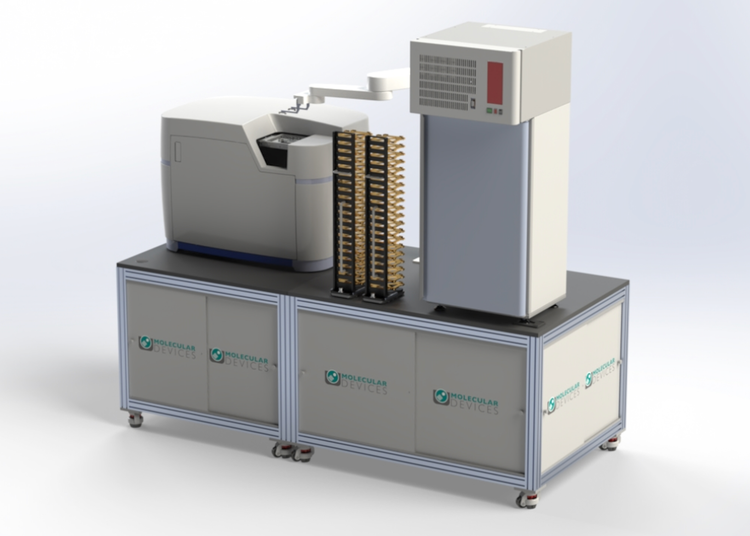End-to-End Lab Automation: Scalable Solutions for High-Content Screening Workflows
Lab automation for high-throughput, high-content screening (HCS) is a transformative approach that integrates automated systems to streamline and scale complex cellular screening workflows. It enables researchers to conduct detailed phenotypic and cellular analyses across large sample sets with minimal manual intervention, improving consistency, throughput, and biological relevance of results. High-content screening combines high-content imaging and analysis to extract multiparametric data from cells or 3D organoid models, supporting applications in drug discovery, toxicology, and basic research. Advances in automation, imaging technology, and AI-driven analysis now allow HCS to be performed at scale with robust, unbiased data output.
Molecular Devices offers an end-to-end lab automation solution for high-content screening that covers the entire live 2D/3D cellular workflow—from cell culture, treatment, and incubation to imaging, analysis, and data processing. This comprehensive approach ensures standardized, reproducible workflows that deliver biologically relevant results at scale. The system includes intuitive scheduling software that allows remote control and real-time monitoring of cell development, automated incubators and collaborative robots for consistent culture conditions, automated liquid handling for media exchange and compound treatment, and label-free imaging to assess assay readiness over time.

Scalable walkaway automation: Flexible solutions for high-content screening with ImageXpress HCS.ai system
For laboratories beginning their automation journey, Molecular Devices offers flexible, scalable solutions that simplify the transition to automated high-content screening workflows. Starter automation options—such as walkaway automation for the ImageXpress® HCS.ai High-content Screening System—streamline plate handling and integrate advanced imaging with AI-powered analysis. With this system, you can image more plates in less time—processing 40 microtiter plates (96-well format) in just 2 hours, or 80 plates in 4 hours, all with complete hands-off operation. This approach boosts throughput, ensures high data quality, and minimizes manual steps. As your research evolves, these modular systems scale from basic plate handling to fully integrated, customized workcells—delivering consistent, reproducible results with optimized efficiency.
Key advantages of scalable lab automation
- Walkaway efficiency: Process hundreds of plates unattended—freeing up valuable lab time.
- Higher throughput, better reproducibility: Automated imaging ensures consistent, reliable results.
- Modular and scalable: Expand your system as your research grows.
- Seamless integration: Compatible with your preferred software and lab setup.
- Future-ready: Upgrade easily with new capabilities as they emerge.
Ready to accelerate your research?
Download the flyer to see how scalable automation can transform your lab workflow.

Standardized automated workcells: Comprehensive integration for seamless workflows
For laboratories ready to expand beyond starter automation, Molecular Devices provides standardized automated workcells that seamlessly integrate a broad range of advanced instrumentation into a unified workflow. These workcells are designed to streamline operations from sample preparation through data acquisition and analysis, enhancing both throughput and reproducibility.
Key components of a typical automated workcell include:
- ImageXpress High-content Imaging System(s)
- Precise Automation PreciseFlex 400 robot
- Plate hotels
- Biosero Green Button Go automation scheduling software
- LiCONiC Wave STX44 automated CO2 incubator
- Bionex Solutions HiG4 automated centrifuge
- AquaMax Microplate Washer
- SpectraMax Microplate Reader with SoftMax Pro Software
- Beckman Coulter Biomek i7 automated liquid handler
By combining these leading-edge instruments and software solutions, Molecular Devices ensures that every stage of the high-content screening workflow—from sample handling and incubation to imaging, analysis, and data management—is optimized for efficiency and reliability. This integrated approach enables laboratories to scale operations while maintaining high standards of data quality and operational consistency.
Customized automated workstations: Tailored solutions for complex lab needs and 3D biology innovation
For laboratories with unique or complex requirements, Molecular Devices delivers customized workstation solutions based on proven experience. Our cellular workflow automation specialists have collaborated with research teams to implement tailored hardware and software solutions—such as developing custom labware for specialized assays, engineering transfer pins for specific cell types, modifying software interfaces for seamless integration, connecting automation systems to LIMS, and enabling control of bespoke hardware.
This consultative approach is grounded in real-world project experience, ensuring that each automated workflow is precisely adapted to the needs of diverse assays and protocols. Molecular Devices also provides comprehensive services—from initial consultation and throughput analysis to validation testing and ongoing support—to maximize uptime and system performance.
Organoid Innovation Center
Check out our Organoid Innovation Center at Molecular Devices where we showcase these cutting-edge technologies with novel 3D biology methods to address key challenges of scaling complex 3D biology. The collaborative space brings customers and researchers into the lab to test automated workflows for organoid culturing and screening, with guidance from in-house scientists.

